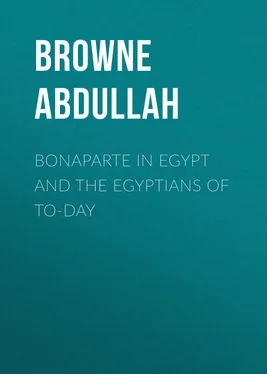Abdullah Browne - Bonaparte in Egypt and the Egyptians of To-day
Здесь есть возможность читать онлайн «Abdullah Browne - Bonaparte in Egypt and the Egyptians of To-day» — ознакомительный отрывок электронной книги совершенно бесплатно, а после прочтения отрывка купить полную версию. В некоторых случаях можно слушать аудио, скачать через торрент в формате fb2 и присутствует краткое содержание. Жанр: Историческая проза, foreign_antique, foreign_prose, foreign_language, на английском языке. Описание произведения, (предисловие) а так же отзывы посетителей доступны на портале библиотеки ЛибКат.
- Название:Bonaparte in Egypt and the Egyptians of To-day
- Автор:
- Жанр:
- Год:неизвестен
- ISBN:нет данных
- Рейтинг книги:4 / 5. Голосов: 1
-
Избранное:Добавить в избранное
- Отзывы:
-
Ваша оценка:
- 80
- 1
- 2
- 3
- 4
- 5
Bonaparte in Egypt and the Egyptians of To-day: краткое содержание, описание и аннотация
Предлагаем к чтению аннотацию, описание, краткое содержание или предисловие (зависит от того, что написал сам автор книги «Bonaparte in Egypt and the Egyptians of To-day»). Если вы не нашли необходимую информацию о книге — напишите в комментариях, мы постараемся отыскать её.
Bonaparte in Egypt and the Egyptians of To-day — читать онлайн ознакомительный отрывок
Ниже представлен текст книги, разбитый по страницам. Система сохранения места последней прочитанной страницы, позволяет с удобством читать онлайн бесплатно книгу «Bonaparte in Egypt and the Egyptians of To-day», без необходимости каждый раз заново искать на чём Вы остановились. Поставьте закладку, и сможете в любой момент перейти на страницу, на которой закончили чтение.
Интервал:
Закладка:
Thus it was the aspirations of the French nation for the extension of its influence in the Mediterranean and for the acquisition of new colonies and its conquest rivalry with England, and not events in the country itself, that heralded the dawn of the new period, and eventually, though chiefly indirectly, produced the greatest change in the condition and prospects of the people that their history records.
The rapidity with which the French expedition was prepared, and the secrecy with which its destination was concealed, led the Directory and Bonaparte himself to hope that it would escape all risk of interference on its way to Egypt. In this they were not disappointed, but hearing of the assembling of a great military and naval force in the south of France, and believing that it was intended to make a descent upon the Irish coast with a view to co-operation with the rebels there, Lord Vincent warned Nelson to watch for, and, if possible, destroy it. The people of India were then, however, like those of Ireland, in negotiation with the French, and in particular the famous Tippoo Sultan, "The Tiger of Mysore," longing to be revenged for the defeat and losses Lord Cornwallis had inflicted upon him, had sought their aid. Nelson was aware of this, and having a strong sense of the danger to English interests in India and the East generally the possession of Egypt by the French would be, guessed the real destination of the expedition, and finding that the French had got away to sea, immediately started in pursuit, and, acting upon his own conception as to its aim, steered straight for Egypt. Bonaparte had, however, after leaving the French coast, proceeded to Malta, which he seized, and being thus delayed some days on his way to Egypt, Nelson passed without falling in with him, and thus it was that on June 21st the Alexandrians were startled by the approach of the English Fleet.
As soon as the character of the ships thus unexpectedly appearing on their coast became known the town was thrown into a state of the greatest excitement, and the Governor, believing that the fleet was a hostile one, sent off to Cairo the messengers whose arrival there I have already chronicled, and at the same time sent other messengers to summon the Bedouins, or nomad Arabs, inhabiting the neighbouring deserts, to assist in the defence of the town.
Nelson lost no time in sending ashore to seek news of the French, but the reception given to his officers was far from friendly. Refusing to credit the statement that the English came as friends and protectors and not as enemies, the Governor openly expressed his distrust, and in doing so simply voiced the feelings of the people. Utterly ignorant of everything outside the narrow range of their own experience, it was indeed impossible for these to comprehend how the occupation of Egypt by the French could be a matter of vital importance to the English. So when Nelson's officers assured the Governor that they asked nothing more than to await the arrival of the French and to buy a few supplies of which the fleet was in need, he answered them that they could have nothing. "Egypt," said he, "belongs to the Sultan, and neither the French nor any other people have anything to do with it, so please go away."
It was a bold speech, and as foolish as it was bold, for no one knew better than the Governor himself that he was quite powerless to oppose the English if they wished to land, or to take what they needed by force. It was a speech, too, worth noticing, for it affords a clue to much that puzzles the ordinary critic of Egyptian history. Judged by any known canon of social or international courtesy or policy, it was not less inexcusable than indiscreet, for it was as likely to enrage an enemy as to anger a friend, but it was just what one knowing the people might have expected – the utterance of the impulse of the moment, and, therefore, a full and truthful statement of the speaker's thought. For to the Egyptian mind the visit of a fleet of foreign ships of war could have no other object than the conquest or raiding of the country, hence the English Fleet must be a hostile one. It was neither lawful nor wise to give provision or succour of any kind to an enemy, therefore they had nothing to say to the English but "Please go away."
It was thus that the people of Alexandria argued then, and it is thus that the people of Egypt generally still argue. For they have always been incapable of taking a broad or general view of any subject. No matter how many-sided a question may be, they, as a rule, can see but one aspect of it at a time. They look, in fact, at all things through a mental telescope that, bringing one narrow and limited aspect of a subject into bold and clear relief, shuts from their vision all that surrounds it. Hence when, as they can and sometimes do, they change their point of view, the change is commonly as abrupt as it is thorough, and those who see only the surface tax them with fickleness. Of late years there have been signs that, at all events, the educated classes are learning to reason on surer and safer grounds; but if the reader would understand their story, he must ever bear in mind the narrow basis of their judgments and, therefore, of their actions.
While the answer of the Governor to the English is thus illustrative of a point to be remembered in the character of the Egyptians, the life-story of the man himself also helps us to more fully grasp their mental attitude under the changing circumstances of the period. This Governor, Sayed Mahomed Kerim, was an Egyptian of humble birth, but one of Arab blood, claiming to be a Sayed or Shereef; that is to say, a descendant of the Prophet Mahomed's family, and thus one of the Arab nobility. In his early manhood this man, who as a Sayed, was and is blessed and prayed for by every Mahomedan in the world at every time of praying, was glad to fill the modest post of a weigher in the Customs. Gifted with intelligence and other qualities that commended him to his superiors, by their favour and his own ability he rose rapidly to become the local Director of Customs, and eventually, as we find him, Governor of the town. That in this position he had the confidence and respect of his townsmen seems clear; and it is thus evident that, tyrannical and oppressive as was the rule under which they lived, there was an open path to place and power for able men. Bribery and corruption, it is true, were rife, so much so, that we may safely assume that Sayed Mahomed did not attain his high position wholly without their aid, but they did not play the dominating part assigned them by historians of the time.
We shall see but little more of this Sayed Mahomed, for though still a young man, he had but a short span of life to run, yet the little we shall see makes him a notable man, and one that should be studied. Bold, impulsive, proud and fearless, with that decision of character so praised by Foster; quick to decide and unalterable in his decisions, deciding rightly from his own standpoint, but often with too limited a view – emphatically more of an Arab than an Egyptian type, and yet in the few glances we get of him, illustrating, most aptly, the Egyptian character. Thus, as his answer to the English was essentially Egyptian and not Arab in substance and manner, so also was his subsequent action. For an Arab in such a strait would have sought to gain time by fair-speaking, so that he might take such measures as he could, or at the worst secure better terms, whereas Sayed Mahomed spoke in a manner that, had the English been, as he supposed, enemies, must have precipitated hostilities, and having done so, again Egyptian-like, made no adequate attempt to protect the town from the possible consequences of his rashness.
Whether fortunately or otherwise no man can say, Nelson, too intent upon the object he had in view to be moved from his immediate purpose, took the rebuff offered him calmly, and, after a day's rest off the port, sailed away, leaving the Alexandrians to congratulate themselves upon their own astuteness and to indulge themselves in vain-glorious anticipations of the prodigies of valour they were to perform should the French land upon their shores.
Читать дальшеИнтервал:
Закладка:
Похожие книги на «Bonaparte in Egypt and the Egyptians of To-day»
Представляем Вашему вниманию похожие книги на «Bonaparte in Egypt and the Egyptians of To-day» списком для выбора. Мы отобрали схожую по названию и смыслу литературу в надежде предоставить читателям больше вариантов отыскать новые, интересные, ещё непрочитанные произведения.
Обсуждение, отзывы о книге «Bonaparte in Egypt and the Egyptians of To-day» и просто собственные мнения читателей. Оставьте ваши комментарии, напишите, что Вы думаете о произведении, его смысле или главных героях. Укажите что конкретно понравилось, а что нет, и почему Вы так считаете.












